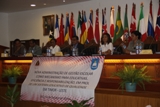MoE talks about school administration and management

On October 3 and 4, at the Convention Centre in Díli, the Ministry of Education met with the directors and persons responsible for administration and management of the Establishments of Integrated Basic Education.
The intent of this two-day workshop was to talk about the role of good management, a role which is incumbent on directors and deputy directors who lead this function.
João Câncio Freitas, Minister of Education, spoke of the fact that the school administration assumes a philosophy and politics that guide it according to the priority established for education, taking into account the context of educational problems in reality.
The aim of the school administration is to educate children, young people and adults, and not only involves them but also parents, teachers, staff, community and national interests. A good management requires planning, organization, implementation and evaluation.
The primary schools are social units, dynamic organisms and are characterized by a series of relationships between the elements that affect it directly or indirectly. And this is where school management must be discussed. The Minister of Education began by speaking of two types of management: the democratic and the participatory.
Currently, there is a democratization of school management, which was established with the Legal Regime for Primary School Administration and Management despite still practicing an autocratic, centralized administration, in which all decisions belong solely to the director.
"In democratic management, education is a task for all: family, society, government. This requires the involvement of each and everyone to understand it as a collective and dynamic process, and demanding concrete action. It is necessary for democratic management to be experienced daily in schools, incorporated into the daily lives and becomes as essential to school life as is the presence of teachers and students, "said João Câncio Freitas.
Still on democratic management, everyone connected to the school should be represented and decide on the administrative, financial and educational aspects and this happens when society is integrated into the school.
When it comes to participatory management, one necessarily talks about the director’s role. "The role of the director is very important if he believes there is no satisfactory administration without the participation of all and that there is no consistent participation of all without the role of coordinator. What happens is that participation must be aware that the manager must impose as little as possible, accept the delays derived from the participatory process, overcome the fear of being overtaken and losing some privileges, knowing that it is possible that he/she will be faced with different ideas and contradictory to his/hers and contain the centralizing and individualistic tendency when making decisions", highlighted the Minister of Education.
According to the Minister any of the discussed management models and implicit leadership models, constitute a great challenge and require a long period of time for orientation and training.










































